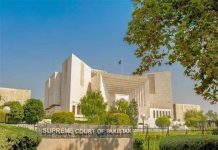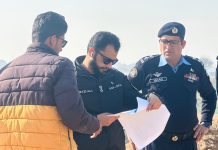By Ajmal Khan Yousafzai
ISLAMABAD: On 11th January 2021, Institute for Political Studies (IPIS), Tehran, Iran, and Center for Global & Strategic Studies (CGSS), Islamabad, Pakistan jointly organized an Online International Conference on, “A Review of the Most Important Developments in the World and the Region in 2020â€
The conference was commenced with the opening remarks of, Seyed Kazem Sajjadpour, President, Institute for Political and International Studies, Tehran, Iran. He highlighted the issues of the Arab world and its connectivity with the United States of America, post-Trump America. He also emphasized that the destiny of Afghanistan is also an important aspect to discuss. He mentioned his affiliation with CGSS in various projects and suggested that more contacts and connectivity are important between Iran and Pakistan.
Prof. Dr, Shabir Ahmad Khan, Director, of Area Study Center, (Russia, China & Central Asia), the University of Peshawar in his opening remarks welcomed the esteemed panelists and stated that it is important to highlight the issues regarding security between Iran and Pakistan.
The conference was conducted in two sessions, Theme of the first session was, Regional Issues, the West and South Asia. It was moderated by Mr. Majid Ghafelebashi, Vice-President for Research, Institute for Political and International Studies, Tehran, Iran.
Mr. Hassan Ahmadian, Professor, University of Tehran, Iran discussed that during the Trump Administration, they didn’t realize that excluding an important power like Iran can have wide-ranging repercussions. He further emphasized that Pakistan can play an effective role in mediating many regional issues and bring peace in the region. He highlighted that Pakistan and Iran’s cooperation is important because both countries are regional powers. Iran acknowledges Pakistan as a regional country that can play an important role in mediating issues and contribute to regional stability. Strategic cooperation between the two countries can strengthen their strategic choices. We need to focus on how to increase bilateral relations. Mentioning a few sectors of cooperation, he discussed the economic side, mediation aspect, and cultural dimensions as well.
Prof. Dr. Muhammad Saleem Mazhar, Pro-Vice-Chancellor, University of Punjab, Lahore, Pakistan mentioned the legacy of Allama Muhammad Iqbal for Iran and Pakistan. He stated Afghanistan is a key for stability in this region. Discussing peace in the region he highlighted that Indian illegal revocation of the status of Indian Occupied Jammu and Kashmir has severely affected peace in the region.
Discussing the efforts of China for peace in the region, he stated that when we strengthen relations between countries it facilitates social, cultural, and political relations. Pakistan and Iran should also follow this course and take steps towards regional cooperation and contribution towards peace and mutual development.
Discussing joint academic collaborations between Pakistan and Iran he welcomed student and teacher exchange programs. Furthermore, he highlighted that if we move forward at a good speed, the situation can get better. The suggestions discussed today must be materialized to bring peace, prosperity, and stability in the region.
Mr. Saeed Ghaderi, Senior Research Fellow, Institute for Political and International Studies, Tehran, Iran stated that Iran has always supported peace and stability in Afghanistan and Iran has always advocated as well as welcomed initiatives in this regard. We agree that peace and security in Afghanistan are important for Iran and Afghanistan.
Highlighting the role of Pakistan and Iran he highlighted that Pakistan and Iran both have suffered from instability in the region due to regional issues, and now both countries must cooperate and work together to solve issues in Afghanistan.
Prof. Dr. Shabir Ahmad Khan, Director, of Area Study Center, (Russia, China & Central Asia), University of Peshawar, Pakistan discussed the impacts of the presence of Extra Regional Powers on the Escalation of Regional Crises.
He discussed that the world is going through a transformation and a shift. Asia is rising through the revival of Silk roads. Commenting on the layover phenomenon, he stated that it restricts the roles of regional states in maintaining regional security. The layover phenomenon occurs when an extra-regional major power directly intervenes in a region’s security it suppresses the regional politics and regional politics are absorbed by politics at a global level. This complicates the security of a region as global powers have always been competing and conflicting interests.
He concluded by mentioning that the Pak-China friendship may have irked the USA and India but it has never constrained Iran’s regional strategic or economic interests. China’s rise, Iran’s natural resources, and Pakistan’s geo-strategic location all have the potential to bring peace and prosperity to this region through trilateral cooperation. Regional cooperation is the only way to overcome the challenge of security and socio-economic development.
The second session of the conference was based on the theme, International Issues, the new administration of the United States, and COVID-19. It was moderated by Ms. Laraib Fatima Hassan, Communication & Coordination Manager, Center for Global & Strategic Studies (CGSS), Islamabad, Pakistan.
Mr. Kayhan Barzegar, Director, Center for Middle East Strategic Studies, Tehran, Iran highlighted that the US presence is a source of instability in the region. It is expected that there will be a reverse from Trump’s policies under the upcoming Biden administration. He further emphasized that Trump’s policies of fighting China as well as his policies in Afghanistan and Yemen have destabilized the region. Commenting on the new US administration he stated that the US will be busy curtailing COVID-19 hence, revision of Trump’s policies might take some time. According to Mr. Kayhan, it will be better and suitable for both Pakistan and Iran if the Us Administration leaves its policy of interference in this region. He suggested that Pakistan, Iran, and other countries of the region are capable of solving their own internal and diplomatic issues.
Brigadier Akhtar Nawaz Janjua, (Retd), Senior Member Advisory Board, Center for Global & Strategic Studies (CGSS), Islamabad, Pakistan. He discussed the Impacts of the New US administration on the International Issues. He stated that the Trumps “Make America Great Again†policy has resulted in U.S standing alone on more key global issues than ever before. He analyzed few of the policy changes that Biden has announced and stated that, It is expected that the new administration will return to a two-state formula in its approach to Middle East peacemaking. Which will be less ideological and more focused on what might be described as core principles. These principles will involve greater emphasis on human rights.
Furthermore, it will be interesting to see if he stays true to “Revitalizing our national commitment to advancing human rights and democracy around the world,†with reference to India’s actions in occupied and illegally annexed Kashmir.
Mr. Vahid Karimi, Senior Research Fellow, Institute for Political and International Studies, Tehran, Iran highlighted the importance of multilateralism. He explained that the new US administration under Joe Biden will have a strong government in the congress and the White House. He will have no excuse for implementing illogical policies like his predecessors Trump.
He suggested that we must use this pandemic as an opportunity to enhance multilateralism amongst our partner countries.
Discussing the cooperation between Pakistan and Iran, he welcomed all suggested initiatives and also suggested trilateral cooperation between Pakistan, Iran, and Turkey for working towards peace, stability, and development in the region.
Prof. Dr. Iram Khalid, Chairperson, Political Science Department, University of the Punjab, Lahore, Pakistan discussed the challenges of the new US Administration. She highlighted some major challenges to the new administration like social Legitimacy, Economic security, Human security in the context of health, jobs, and the education sector. She further mentioned that the USA will have to pay the price for withdrawing from various important international organizations and its behavior towards the World Health Organization.
Discussing the new Biden administration, she said that he will try to continue the policies of Democrats and various state departments. He will also be keen to work towards restoring US glory.
She suggested that we have to re-establish links between academia by dialogues and activities like the one we are involved in right now. Various Universities from Pakistan and Iran can be involved as well and by involving those who hold specific positions, trust-building can be done between people of both Iran and Pakistan.
The conference was attended by 30 expert analysts and students from Pakistan and Iran.





